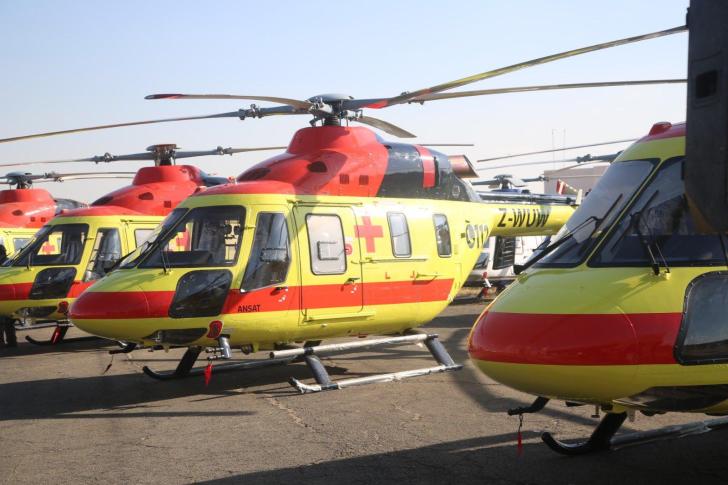News / Local
Bulawayo gets Russian helicopter ambulance
29 Dec 2024 at 08:41hrs |
1 Views

The Matabeleland region saw a major advancement in its emergency medical services yesterday with the arrival of the first of two dedicated air ambulances from Helidrive Zimbabwe. The state-of-the-art helicopter, destined for the United Bulawayo Hospitals (UBH), touched down at Joshua Mqabuko Nkomo International Airport shortly before 11 AM, heralding a new era in healthcare for the region.
The aircraft arrived with a four-member crew, including Russian co-pilots Aleksander Rusanov and Denis Salikhov. The second helicopter, expected soon, will complete a vital fleet serving the entire Matabeleland region, providing rapid medical assistance for road accidents and other emergencies.
The two helicopters are part of a larger initiative involving six medical aircraft, strategically stationed in Harare Metropolitan, Manicaland, Victoria Falls, and Bulawayo Metropolitan. The project forms part of President Mnangagwa's broader healthcare modernisation agenda, aimed at creating a highly industrialised and prosperous Zimbabwe by 2030.
"The helicopter will be based here in Bulawayo. This is a Presidential project, and we are working on his instructions," said Rusanov, highlighting the Government's commitment to improving healthcare accessibility.
In June, President Mnangagwa's visit to Russia secured Helidrive Air Ambulance as a key partner in establishing this cutting-edge service. With nine years of experience operating over 100 medical helicopters across Russia, the company has brought its expertise to Zimbabwe, training 40 local pilots, 50 doctors, 100 nurses, 100 dispatchers, and 10 engineers.
These air ambulances are equipped with intensive care facilities, enabling them to deliver advanced medical care while navigating geographical barriers.
The air ambulance initiative officially launched in August during the 44th Southern African Development Community (SADC) summit. Its inaugural mission transported a cardiac arrest patient from Chegutu to Harare in just 20 minutes, a significant improvement over the typical two-hour road journey, adhering to the "Golden Hour" principle of emergency care.
The introduction of these airborne ICUs is expected to save lives, especially in remote and underserved areas.
The arrival of the second helicopter was met with excitement and optimism in Bulawayo. Winos Dube, chairperson of the Bulawayo Residents Association (BURA), hailed the development as a crucial step forward in healthcare accessibility. However, he emphasised the need for equitable access to the service.
"We applaud the Government and our President for the kind gesture. We hope, however, that every person who needs emergency medical attention will access this. It must not be based on one's position in society. Nonetheless, we are excited as its presence will indeed save lives," said Dube.
The air ambulance project represents a significant milestone in Zimbabwe's healthcare transformation, promising faster response times, improved medical outcomes, and enhanced accessibility. As the nation continues to modernise its healthcare sector, these efforts highlight a commitment to delivering lifesaving services to all citizens, regardless of location or circumstance.
The aircraft arrived with a four-member crew, including Russian co-pilots Aleksander Rusanov and Denis Salikhov. The second helicopter, expected soon, will complete a vital fleet serving the entire Matabeleland region, providing rapid medical assistance for road accidents and other emergencies.
The two helicopters are part of a larger initiative involving six medical aircraft, strategically stationed in Harare Metropolitan, Manicaland, Victoria Falls, and Bulawayo Metropolitan. The project forms part of President Mnangagwa's broader healthcare modernisation agenda, aimed at creating a highly industrialised and prosperous Zimbabwe by 2030.
"The helicopter will be based here in Bulawayo. This is a Presidential project, and we are working on his instructions," said Rusanov, highlighting the Government's commitment to improving healthcare accessibility.
In June, President Mnangagwa's visit to Russia secured Helidrive Air Ambulance as a key partner in establishing this cutting-edge service. With nine years of experience operating over 100 medical helicopters across Russia, the company has brought its expertise to Zimbabwe, training 40 local pilots, 50 doctors, 100 nurses, 100 dispatchers, and 10 engineers.
These air ambulances are equipped with intensive care facilities, enabling them to deliver advanced medical care while navigating geographical barriers.
The air ambulance initiative officially launched in August during the 44th Southern African Development Community (SADC) summit. Its inaugural mission transported a cardiac arrest patient from Chegutu to Harare in just 20 minutes, a significant improvement over the typical two-hour road journey, adhering to the "Golden Hour" principle of emergency care.
The introduction of these airborne ICUs is expected to save lives, especially in remote and underserved areas.
The arrival of the second helicopter was met with excitement and optimism in Bulawayo. Winos Dube, chairperson of the Bulawayo Residents Association (BURA), hailed the development as a crucial step forward in healthcare accessibility. However, he emphasised the need for equitable access to the service.
"We applaud the Government and our President for the kind gesture. We hope, however, that every person who needs emergency medical attention will access this. It must not be based on one's position in society. Nonetheless, we are excited as its presence will indeed save lives," said Dube.
The air ambulance project represents a significant milestone in Zimbabwe's healthcare transformation, promising faster response times, improved medical outcomes, and enhanced accessibility. As the nation continues to modernise its healthcare sector, these efforts highlight a commitment to delivering lifesaving services to all citizens, regardless of location or circumstance.
Source - The Herald
Join the discussion
Loading comments…































